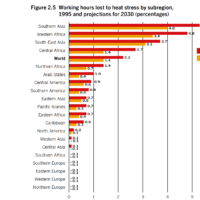-
At least 6 people killed in mob lynching incidents in Bihar in past week
Not just that, a dozen more incidents of mob violence have also been reported in which people were attacked, thrashed, injured, abused and humiliated by mobs for alleged crimes or no crimes in some cases.
-
For a new world
Basking in record-breaking high tempertures, slowly barbecuing ourselves, Britons may well welcome the benefits of global warming. Don’t fool yourselves.
-
‘These terms have a history and a power we have to acknowledge’
CounterSpin interview with Lawrence Glickman on racism & euphemism
-
‘This is the beginning’: new study warns climate crisis may have been pivotal in rise of drug-resistant superbug
Research argues that deadly Candida auris “may be the first example of a new fungal disease emerging from climate change.”
-
Cuba witnesses Nation’s first transgender marriage
Cuba witnessed the nation’s first transgender legal union this week when a couple was married at the Palace of Marriages of San Francisno de Paula in Havana, the National Center for Sex Education (Cenesex) reports.
-
A conversation with Aijaz Ahmad: ‘The state is taken over from within’
Aijaz Ahmad argues that the Rashtriya Swayamsewak Sangh (RSS) and its fronts, including the Bharatiya Janata Party (BJP), display distinct fascistic characteristics, but the Indian state continues to live by the liberal playbook, no matter how hollow the Indian liberal institutions may have become. He anchors this proposition in a distinctive theoretical position.
-
Fukushima: an ongoing disaster
n March–on the eighth anniversary of the Fukushima disaster–Time magazine published an article with the headline: “Want to Stop Climate Change? Then It’s Time to Fall Back in Love with Nuclear Energy”.
-
States collaborating with the far-Right
It is not the collapse of Conservatism causing the rise of the far-right in America, Europe and Britain, it is the opposite. It is, however, important to understand that this is exactly how fascism comes to power.
-
Global Britain’s Real Climate Changers: Big Oil Must Be Taken Down
There is no global social unity in the face of climate disaster. Yet we need a genuinely internationalist rebellion against the corporations at the extractive imperialist heart of British capitalism. Their extinction as a species is required to save the planet.
-
Science group opposes planned immigration raids, mistreatment of immigrants
Statement by Ken Kimmell, President, Union of Concerned Scientists
-
Close the concentration camps
The U.S. government is detaining thousands of migrants, in what can only be described as a system of 21st century concentration camps. Justin Akers Chacón—professor of U.S. History and Chicano Studies in San Diego and author, with Mike Davis, of No One is Illegal—examines the background to this horrific story, suggesting that Trump’s detention centres are just the latest in a long line of racist systems of incarceration in the U.S.
-
Amid crisis and sanctions, LGBTI activists continue to demand change
One of the sectors hardest hit by Venezuela’s economic crisis is the nation’s LGBTI community. Lacking access to life-saving medicines and denied certain rights, activists say there is still much to be done within the revolution.
-
Inequality metrics and the question of power
How should we measure inequality?
-
Policing in the Anthropocene
How will the police respond to environmental direct action groups like Extinction Rebellion as climate breakdown reaches critical mass?
-
Burnt workers are the newest wave of climate casualty
The International Labor Organization (ILO) has just released a brief—but very important—report on the impact of heat stress on workers. What the ILO finds is that the areas of the world most threatened by heat deaths of workers are Southern Asia and Western Africa.
-
Numbers crushing working people
It is vital that working people know the score. Only by accurate and complete economic representations can an informed electorate pursue political strategies and tactics that benefit all working people.
-
British firm ‘hosts canned lion hunts’
Blackthorn Safaris, based in Oswestry, hosts ‘canned’ hunts on an estate 40 miles north of the mining town of Kimberly, in South Africa’s Northern Cape district.
-
U.S. and Canada are backing an elite white minority in Venezuela
The U.S. and Canada are not supporting “the return of democracy” in Venezuela as they claim. Instead, they are following in their shameful histories of colonialism, imperialism, exploitation, illegal wars of aggression, and overthrowing governments.
-
Discussing the Black Panthers
With the development of new anti-racist movements, there is a renewed interest in the history of the Black Panther Party. Shaun Harkin spoke to Donna Murch—historian and author of ‘Living for the City’—about the overlooked aspects of the Panthers, from their founding days, to their focus on political education.
-
In Dutch still lifes, dark secrets hide behind exotic delicacies
The Dutch Golden Age led to a tremendous outpouring of still-life paintings in the 17th century. Since then, critics have generally belonged to two opposing schools of thought when it comes to interpreting them.




















